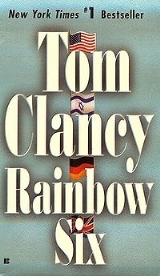
created by American author Tom Clancy
about a fictional international
counter-terrorist unit called "Rainbow." The franchise began with Clancy's novel Rainbow Six
, which was adapted into a successful series of tactical first-person shooter video games.
The novel Rainbow Six describes Rainbow as an international counter-terrorism operation hosted by NATO and funded by money funneled through the U.S.
"Oso backs us up, but I don't think we'll have much use for him on this trip." Julio Vega had become their heavy-machine gunner, slinging a laser-sighted M-60 7.62-mm machine gun for really serious work, but there wasn't much use for that now--and wouldn't be, unless everything went totally to hell.![]()
One of them came outside and lit a pipe--how very Swiss! Popov thought. The bugger probably climbs mountains for personal entertainment, too.![]()
Because of a random event – bad luck. A hell of a thing to tell someone who'd just lost a husband. Cause of death, bad luck.![]()
"Thanks, Doc." Chavez hefted the book for weight and headed out the door. The Enraged Outlook: Inside the Terrorist Mind was the title. It wouldn't hurt to understand them a little better, though he figured the best thing about the inside of a terrorist's mind was a 185-grain 10-mm hollow-point bullet entering at high speed.![]()
The man had to be tense, Popov knew. Betrayal was how most of the people like Fürchtner got caught, and though Dmitriy was known and trusted by them, you could only be betrayed by someone whom you trusted, a fact known to every covert operator in the world. ![]()
They were either very brave or very foolish to go to that country, Popov thought. [...] Bokassa had killed his way to the top, as had so many African chiefs of state, before dying, remarkably, of natural causes--so the papers said, anyway, you could never really be sure, could you?![]()
"We have thought that one through," Hans assured his guest. Popov wondered briefly about that. But he'd be surprised if they even boarded an aircraft, much less got it to Africa. The problem with "missions" like this one was that no matter how carefully most of its parts had been considered, this chain was decidedly no stronger than its weakest link, and the strength of that link was all too often determined by others, or by chance, which was even worse. ![]()

